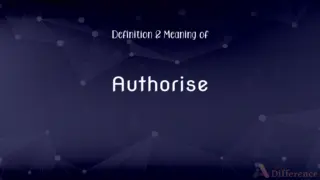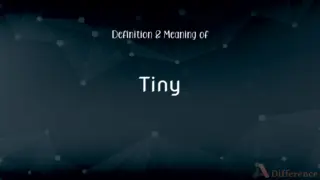Relate Definition and Meaning
By Fiza Rafique & Maham Liaqat — Published on April 4, 2024
Relate is to show or establish a connection or relationship between things or people. e.g., She related her experience to the group, making them understand the situation better.
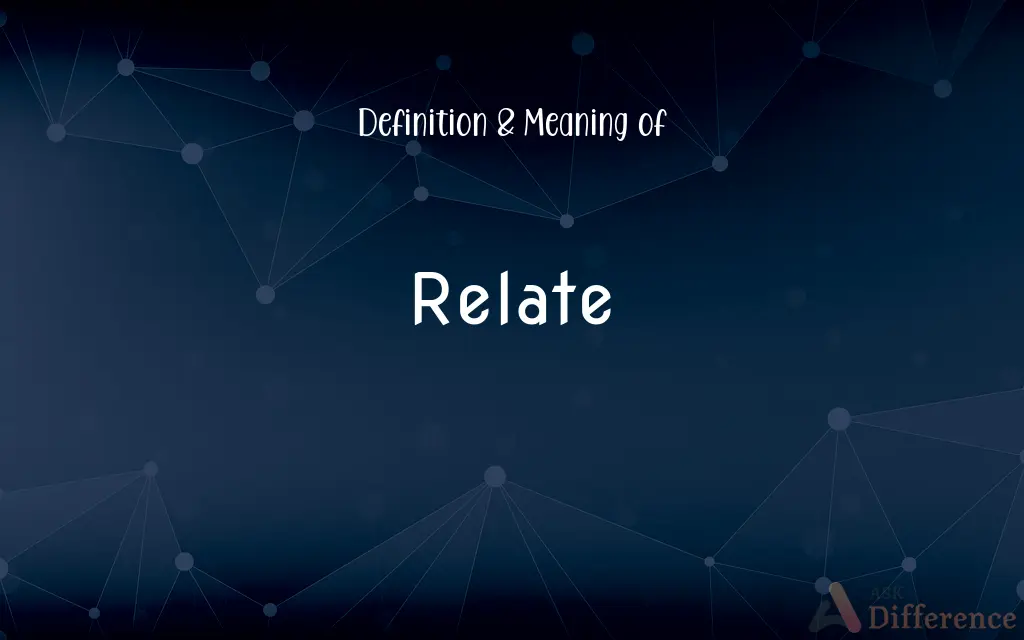
Table of Contents
Relate Definitions
To find understanding or empathy.
He related to the character's struggles in the movie.
To tell a story or describe events.
The grandfather related tales of his youth with vivid detail.
To convey or share information.
He related the news to his family with great excitement.
To connect in one's mind.
She could easily relate the smell of pine to her childhood memories.
To show a relationship or connection between two or more things.
The scientist related the data points to prove her theory.
To establish a link or association.
The teacher related the historical event to current issues.
To feel a sense of identification with someone or something.
She related to the protagonist's journey of self-discovery.
To make reference to.
The article related to several studies on the subject.
To establish a connection.
The lecture related various theories to real-world applications.
To give an account of (an occurrence, for example); narrate.
To establish or demonstrate a connection between
I related his grumpiness to a lack of sleep.
To have connection, relation, or reference
How education relates to income.
A question relating to foreign policy.
To have or establish a social relationship; interact
She relates well to her peers.
To understand or react favorably to someone or something
I just can't relate to these new fashions.
(transitive) To tell in a descriptive way.
The captain related an old yarn.
Please relate the circumstances of your journey here today.
(transitive) To bring into a relation, association, or connection (between one thing and another).
(intransitive) To have a connection.
The patterns on the screen relate to the pitch and volume of the music being played.
(intransitive) To interact.
(intransitive) To respond through reaction.
To identify with; to understand.
I find it difficult to relate to others because I'm extremely introverted.
(obsolete) To bring back; to restore.
To bring back; to restore.
Abate your zealous haste, till morrow next againBoth light of heaven and strength of men relate.
To refer; to ascribe, as to a source.
To recount; to narrate; to tell over.
This heavy act with heavy heart relate.
To ally by connection or kindred.
To stand in some relation; to have bearing or concern; to pertain; to refer; - with to.
All negative or privative words relate positive ideas.
To make reference; to take account.
Reckoning by the years of their own consecration without relating to any imperial account.
Make a logical or causal connection;
I cannot connect these two pieces of evidence in my mind
Colligate these facts
I cannot relate these events at all
Have to do with or be relevant to;
There were lots of questions referring to her talk
My remark pertained to your earlier comments
Give an account of;
The witness related the events
Be in a relationship with;
How are these two observations related?
Have or establish a relationship to;
She relates well to her peers
To relate mutually; to have a connection that affects each other.
The report showed how economic factors interrelate with environmental policies.
Relate Snonyms
Link
To make a connection between two or more things.
She linked her study habits to her academic success.
Connect
To join or associate with.
He connected his theory to the research findings.
Correspond
To be in agreement or conformity.
His feelings correspond with the mood of the song.
Align
To place or arrange things in a straight line.
His views align closely with those of the author.
Tie
To connect or bind.
She tied her love of reading to her early visits to the library.
Communicate
To share or exchange information.
They communicated their ideas effectively during the meeting.
Match
To correspond or be equivalent.
The fingerprints matched those found at the scene.
Refer
To mention or allude to.
The teacher referred to the textbook for further examples.
Associate
To link in one's mind.
She associated the scent of jasmine with her grandmother's garden.
Narrate
To tell a story or give an account of.
He narrated his journey through the mountains with enthusiasm.
Relate Idioms & Phrases
Can't relate
An expression used when one cannot identify with a situation or feeling.
He mentioned his love for skydiving, but I can't relate.
Relate back to
To trace back to a source or origin.
All the clues relate back to the main suspect.
Easy to relate to
Describes someone or something that is easy to understand or empathize with.
The speaker was easy to relate to, thanks to his humorous approach.
Relate to
To feel sympathy or identification with.
Many young adults can relate to the challenges of starting a new career.
Hard to relate to
Describes someone or something that is difficult to understand or empathize with.
The complex character in the novel was hard to relate to at first.
Relate Example Sentences
Many people relate to her story of overcoming adversity.
She found it hard to relate to the abstract art.
It's important to relate these studies to real-world applications.
He couldn't relate to the joy of others at the party.
Can anyone relate a personal experience to this topic?
Can you relate your findings to the theory we discussed?
It's easier to learn when you can relate information to what you already know.
I relate my calmness to practicing meditation regularly.
Common Curiosities
How is relate used in a sentence?
Relate is used to describe the action of making a connection between ideas, things, or experiences, e.g., She related her findings to the rest of the team.
How do we divide relate into syllables?
Relate is divided into syllables as re-late.
What is a stressed syllable in relate?
The stressed syllable in "relate" is the second one, -late.
How many syllables are in relate?
Relate has two syllables.
What is the verb form of relate?
Relate itself is a verb. Its forms are relates, relating, related.
What part of speech is relate?
Relate is a verb.
Why is it called relate?
The term "relate" originates from the Latin word "relatus," meaning to carry back or report. It's used to describe the act of making a connection or association between two or more things.
What is the root word of relate?
The root word of relate is the Latin "relatus," which is the past participle of "referre," meaning to carry back or report.
What is the pronunciation of relate?
Relate is pronounced as /rɪˈleɪt/.
Is relate a vowel or consonant?
The word relate starts with the consonant 'r.'
Which vowel is used before relate?
There is no specific vowel used before "relate"; it depends on the sentence structure.
What is the first form of relate?
The first (base) form of relate is "relate."
What is the second form of relate?
The second form (past simple) of relate is "related."
What is the plural form of relate?
Relate does not have a plural form as it is a verb, not a noun. Its base form is used for plural subjects.
What is the opposite of relate?
The opposite of relate could be "disconnect," "dissociate," or "separate."
Is relate an adverb?
No, relate is not an adverb.
Is relate a countable noun?
Relate is not a noun; it is a verb.
Is the relate term a metaphor?
The term "relate" can be used metaphorically to describe understanding or connecting on an emotional or intellectual level.
Which determiner is used with relate?
Determiners are not typically used with verbs like relate.
What is the singular form of relate?
Relate does not have a singular form as it is a verb, not a noun. Its base form is used for singular subjects.
Is relate a noun or adjective?
Relate is a verb, not a noun or adjective.
Is relate a negative or positive word?
Relate is neutral; it can be used in both positive and negative contexts depending on the sentence.
Is the word relate imperative?
Relate can be used in the imperative form when giving a command or instruction, e.g., "Relate the story to me."
Is the word “relate” a Direct object or an Indirect object?
In a sentence, "relate" is usually the verb, not an object. However, the information being related can serve as a direct object.
What is another term for relate?
Another term for relate is "connect" or "associate."
Is relate an abstract noun?
No, relate is a verb, not a noun.
Is relate a collective noun?
No, relate is a verb and not a noun.
Which article is used with relate?
Articles are not used with verbs like relate.
What is the third form of relate?
The third form (past participle) of relate is also "related."
Is the word relate a Gerund?
"Relating" is the gerund form of the verb relate.
Which preposition is used with relate?
Prepositions such as "to" and "with" are commonly used with "relate."
Which conjunction is used with relate?
Conjunctions are not specifically associated with "relate"; it depends on the sentence structure.
Share Your Discovery
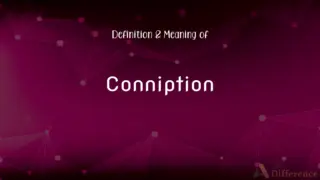
Previous Term
Conniption Definition and Meaning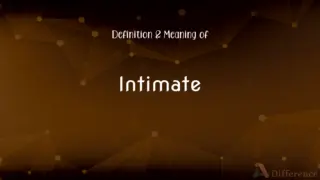
Next Term
Intimate Definition and MeaningAuthor Spotlight
Written by
Fiza RafiqueFiza Rafique is a skilled content writer at AskDifference.com, where she meticulously refines and enhances written pieces. Drawing from her vast editorial expertise, Fiza ensures clarity, accuracy, and precision in every article. Passionate about language, she continually seeks to elevate the quality of content for readers worldwide.
Co-written by
Maham Liaqat






